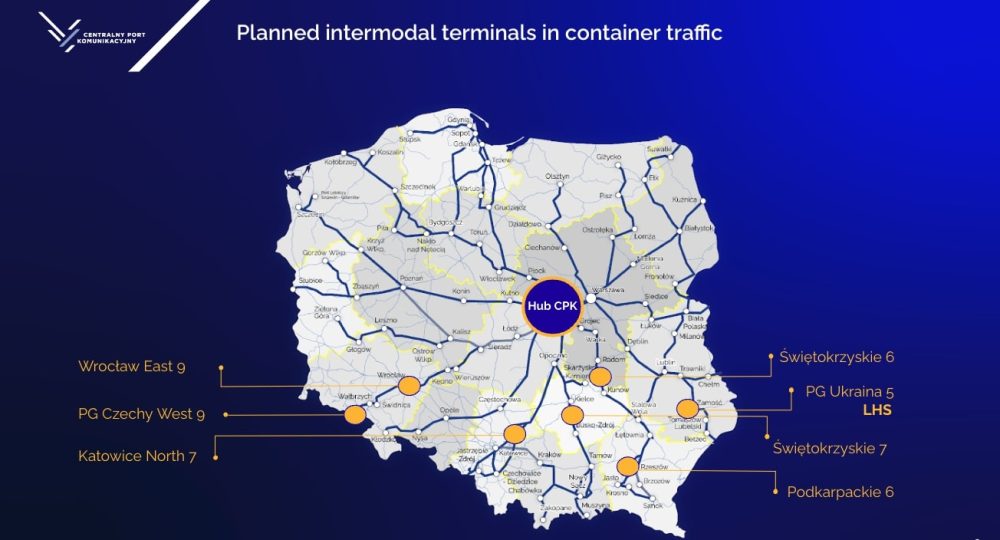CPK project: intermodal freight and military mobility will be core operational elements

From a relatively unknown project a few months ago, the Centralny Port Komunikacyjny (CPK) is gradually transforming into a critical transport infrastructure with big plans. How did this transition occur, and what do these plans entail for rail freight transport within the mega-hub? Mikołaj Wild, the CEO of CPK, shared his views in an exclusive interview with RailFreight.com.
“Several factors contributed to the increased international recognition of the CPK project over the past year”, explained Wild. “Firstly, we have made significant progress in moving from the planning phase to the design phase, with key partners and suppliers contracted to implement the project. Secondly, the strategic importance of the CPK for deeper integration of Central and Eastern European countries into the EU, as well as its role in European mobility and the security and defence of the region and Europe as a whole, has been recognised in Europe”, he adds.
Indeed, the EU Commission has included the CPK rail infrastructure in the core TEN-T network. “In the opinion of the European Commission, the key investments of CPK should constitute priorities in the EU investment policy, and their implementation should become Poland’s contribution to the European transport system”, underlined Wild.
However, as Wild stressed, CPK will be an enormous transport hub integrating air transport, passenger and freight rail services and even buses and taxis. Consequently, a question arises: what role will cargo transport and freight railways play within this diverse operational environment?

Rail freight a vital component
“CPK is set to play a critical role as an integrator in the region by connecting different modes of transportation for both passengers and cargo. Rail freight is a vital component of CPK’s operations as it is an essential element of the hub’s mixed passenger-cargo transport concept”, said Wild.
Most of the CPK railway infrastructure will be high-speed, thus targeting passenger services primarily. However, it will be able to accommodate lighter freight trains that can be included in the train schedule as shuttle trains. “These will be, in particular, intermodal trains carrying containers and semi-trailers”, explained Wild.
The CPK project aims to build a rail freight terminal within the airport’s vicinity to facilitate rail cargo transport. “The terminal will serve the airport and freight trains waiting for slots at CPK railway lines. It will also have a track dedicated to roll-on/roll-off road-rail transhipment of semi-trailers”, highlighted Wild.
Intermodal terminals and military mobility
CPK’s rail infrastructure plans include the construction of both passenger stations and several intermodal terminals to ensure seamless and efficient transport of intermodal units as shuttle services.
According to Wild, planning those locations at a high technical standard, enabling the transhipment of 750-metre-long container or semi-trailer trains in both lift-off/lift-on and roll-on/roll-off technology and links to new railway lines and public roads will facilitate future investments into terminals. This approach will provide good operating conditions for freight operators while ensuring that passenger services run on time and at high speed.

Additionally, Wild was optimistic that the CPK project will increase the security of Poland and Central-Eastern Europe by serving as a ‘dual-use’ infrastructure. “It will be available for use by NATO troops to transfer military units, equipment, goods, or humanitarian aid, as well as supporting forces and rapid reaction units, making it of utmost importance”, he commented.
State maintains control over the project
“CPK is a Polish state-owned Special Purpose Vehicle tasked with the design and delivery of the largest European transport megaproject of its kind”, clarified Wild. He continued explaining the financing plans for the airport itself. The investment will be financed 60 per cent via debt financing (e.g. bonds, loans, etc.) and 40 per cent via private capital from the company managing the airport.
This company will have two shareholders. The financial partner will control a maximum of 49 per cent share, and the State Treasury will provide the remaining 51 per cent. “Such a solution gives the purpose of preserving the state’s control over the project while at the same time benefiting from the know-how and experience of the investor who decides to be a part of the investment”.
Concerning rail investments, Wild mentioned that feasibility studies are underway for most of them to clarify costs and prepare detailed cost estimates. However, he also said costs might eventually change, considering the rising prices in most global markets.
In any case, CPK will not undertake investments alone regarding international connectivity. The strategic partnerships sealed with other projects and companies like Rail Baltica’s central project coordinator and joint venture RB Rail AS, Správa železnic, státní organizace (SZCZ), the national railway infrastructure manager in the Czech Republic and Ukrainian Railways showcase that development of cross-border rail links will be based on cooperation.
Also read:





